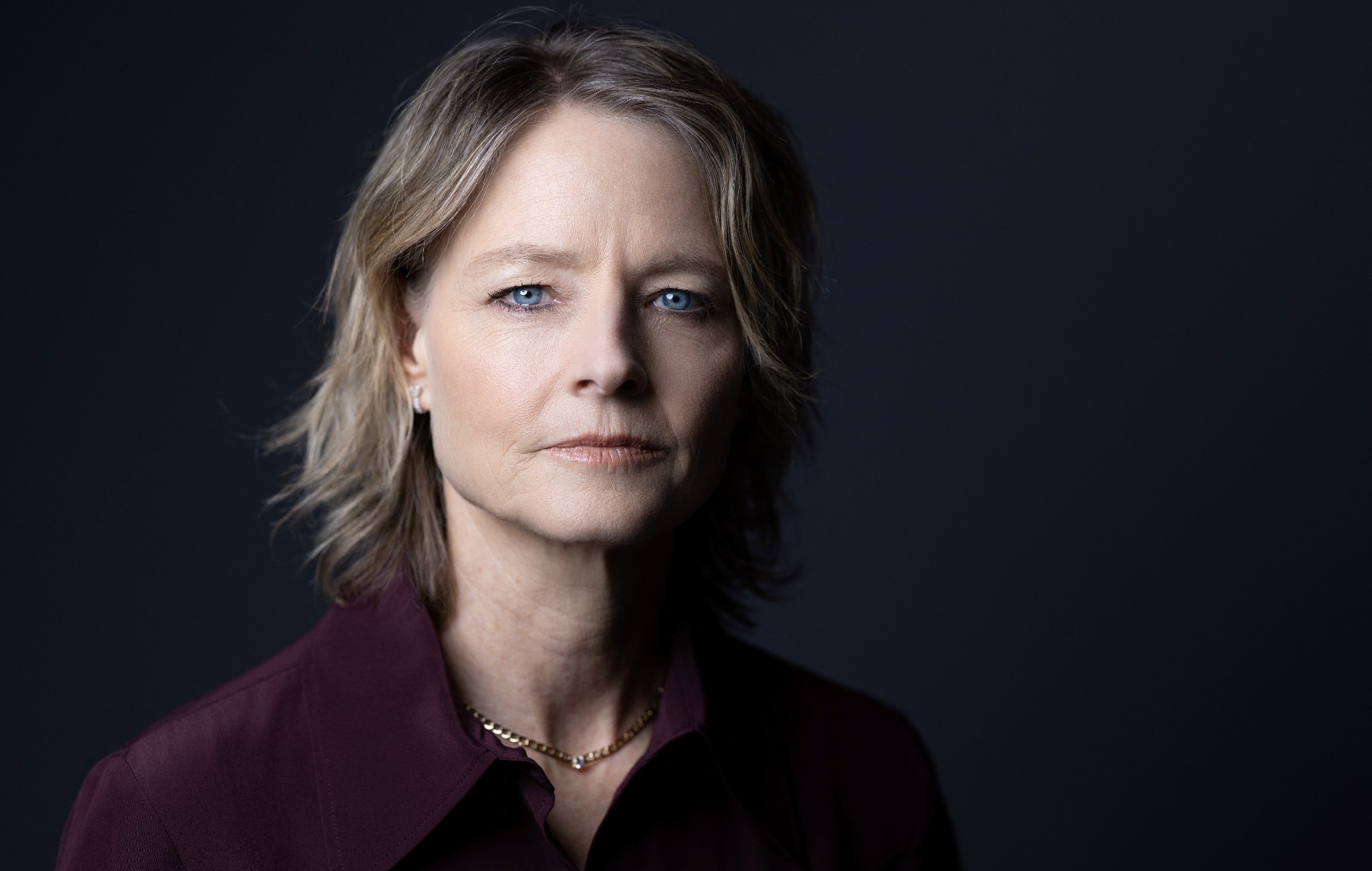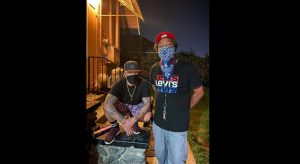Even in Jodie Foster’s extraordinary career – 80-plus acting roles, 10 TV and film directing credits, two Oscars – True Detective: Night Country feels like a standout project. “Not only have I never had such good reviews for a show that I’ve worked on,” she says, “but I’ve never had so much interest in something from the beginning. Like, we had to bat people off.”
Foster stars in the chilling limited series, True Detective‘s fourth iteration, as beleaguered police chief Liz Danvers. She’s stationed in Ennis, Alaska, a small mining town so far north it’s plunged into darkness for two months a year. Danvers has a fraught, fractious working relationship with state trooper Evangeline Navarro (Kali Reis), her former crime-fighting partner, but they team up again when eight scientists at a remote research facility go missing.
For both women, this reunion is practical rather than sentimental. Because tests reveal that a severed human tongue found at the scene belongs to Annie K, an Indigenous woman whose savage unsolved murder still haunts Navarro, they know there must be a connection between the two cases. The stakes are raised again when the scientists’ naked bodies are found on the outskirts of town in a gruesome frozen mass. Is it murder, suicide, or a sinister combination of the two?
“There’s an honesty to Danvers, even though she’s just awful”
Danvers has a strong if skewed sense of justice, but Foster doesn’t mince words when it comes to describing her flaws. “She’s a racist, she has all this implicit bias, she’s totally unconscious, she’s completely self-absorbed,” the actress says. “She tells jokes that aren’t funny. She likes to needle people and just piss them off. And she reacts to things without really understanding why.”
Foster was drawn to Night Country, her first full TV series in 50 years, partly because her character felt so confronting. “There’s an honesty to Danvers, even though she’s just awful,” she says. “So to me, it’s really an opportunity to investigate those shadow sides [of human nature] that people don’t like to talk about.”
The enthralling series finale, which Foster likens to a “perfect movie”, has been forensically dissected by fans since it premiered on Monday. But NME meets Foster a few days earlier, at a fancy co-working space in west London, where she’s about to tape a chat show. When Foster walks in the room, she is friendly, focused and unaffected. She is also instantly familiar as Jodie Foster, the iconic star of Silence of the Lambs and The Accused, but she carries herself lightly. Later, when we ask what she’s most proud of in her career, she says: “That I think I’ve managed to be a real person.”
Kali Reis as Navarro and Jodie Foster as Danvers in ‘True Detective: Night Country’. CREDIT: HBO
We dive into a very spoiler-heavy discussion of the series finale. At the climax, Danvers and Navarro discover that the scientists died in an act of vengeance. When a group of Indigenous women who cleaned their facility realised they murdered Annie K six years earlier, they rounded them up with guns, then led them onto the ice, naked, to meet their fate. The cleaners’ leader Bee (L’xeis Diane Benson) tells Danvers and Navarro that some kind of matriarchal spiritual presence “ate their fucking dreams from the inside out and spit their frozen bones”.
As an executive producer on the series, Foster was able to “have an impact on” the scripts written or co-written by showrunner Issa López, who previously directed the fantastical 2017 horror film Tigers Are Not Afraid. But when Foster read the final episode, she felt instantly that it “should not be touched”.
She believes Danvers even shows some personal growth. “She takes a back seat – she’s not talking during that period [where the women confess],” Foster says. “It really is about them: their story, their voice.” Because the local authorities have already determined that the scientists died in a tragic accident, Danvers and Navarro decide to turn a blind eye. “Look, she’s a corrupt cop – we knew that about her,” Foster says. “But she also understands that justice is difficult to come by.”
True Detective: Night Country is the anthology series’ first instalment not to be steered by its creator, Nic Pizzolatto. Instead, new showrunner López has refreshed and reinvented the previously male-dominated franchise by centering knotty, complex female characters. “The beautiful thing about the last episode is that you’re confronted as an audience member with the fact that you’ve never even thought about those [cleaning] women,” Foster says. “They were invisible to you but they’ve been there all along. There’s something sort of meta about that that I really liked.”
True Detective needed new blood after 2017’s disappointing third season, which was propped up by Mahershala Ali’s sharp central performance, but not everyone has welcomed the overdue injection of female energy. After Night Country’s first episode aired in January, López wrote in a since-deleted tweet that “bros and hardcore fanboys have made it a mission to drag the [show’s] rating down” on Rotten Tomatoes. “I wouldn’t call it a backlash,” Foster says today, “but there is an under-layer of discomfort with strong women.”
Fans also spotted that Pizzolatto seemingly distanced himself from Night Country in Instagram comments screengrabbed and shared on Reddit. When we ask if it feels disappointing that the series creator has said he had “no input” – despite being credited as an executive producer – Foster replies plainly: “Well, he didn’t.”
“No, he really didn’t,” she continues. “Sometimes you get, like, one little comment and then it suddenly mushrooms into this huge thing. For us, it’s kind of a good thing because it gets people talking about the show. But honestly, we’ve never met him so it wasn’t like he ever had a conversation with us.” Even López has never met him? “No, he was gone from True Detective long before Issa was brought in.“
Jodie Foster photographed in Paris. CREDIT: Joel Saget
For much of her career, Foster has been described in the press as a “private person”, a phrase that carried hints of homophobia until she addressed her sexuality publicly for the first time at the 2013 Golden Globe Awards. “I already did my coming out about a thousand years ago, back in the stone age,” she said in a moving and carefully worded acceptance speech.
It’s fair to say she still keeps a low-profile between projects, but there is nothing closed-off about Foster today. Actually, she talks very candidly about her unusual career arc, which has involved only a handful of acting roles in the last decade. Why is that? “Because I’ve spun through a bunch of things I’ve already done that I don’t want to repeat,” she says. “You know, I didn’t become an actor because I wanted to act. I had no choice; I started at [age] three.”
Foster, 61, says she realised early on that she lacked “the same impulse to act” as other actors. “I don’t like to be the centre of attention,” she explains. “I have a big picture view of things – I’m not a moment person. I don’t love wearing my emotions on my sleeve. Like, there’s no part of me that was meant to be an actor.” Reconciling this with the success and attention that acting brought her sounds almost torturous. “If anything, it was kind of a cruel job to give to somebody that was as internal [as I am],” Foster says. “Yeah, it was a kind of a cruel job, actually, so I had to make sense of it.”
Foster’s career began when her older brother, Buddy, auditioned for a TV advert and she was cast instead. She was such a natural that she amassed more than 25 TV credits before her breakthrough movie role in Martin Scorsese’s 1976 classic Taxi Driver. For her performance opposite Robert De Niro as the self-assured child prostitute Iris Steensma, Foster scored her first Oscar nomination (of five to date). She was just 14 at the time.
Coincidentally, they’re all up for Oscars this year: Scorsese and De Niro for Killers of the Flower Moon; Foster for her poignant performance in Nyad as Bonnie Stoll, the rock-solid confidante of long-distance swimmer Diana Nyad (Annette Bening). “Everybody’s like, ‘You’re going to see Robert De Niro and Martin Scorsese at the Oscars – is that kind of wild?’” Foster says, before disarming us with a joke. “I’m like, ‘Well yeah, we’re so old now.’”
“I don’t even know how I’m still here”
Foster essentially grew up on screen, but segued to adult roles so smoothly that she had two Oscars by the time she was 30. She won her first Best Actress award for her powerful performance as rape survivor Sarah Tobias in 1998’s The Accused, then collected a second three years later for Silence of the Lambs. Her fiercely intelligent rendering of Clarice Starling, the FBI trainee assigned to grill Anthony Hopkins’ serial killer Hannibal Lecter, remains her signature role.
Is she used to the idea that everyone she meets will remember her from a film? Her other big hits include body-swap comedy Freaky Friday (1976), psychological drama Nell (1994) and survival thriller Panic Room (2002). “I think you do get used to it,” Foster says. “Aaaaand… it’s just not normal that people know you already and you don’t know them. The life of a public figure is really weird and different people have to make sense of it in different ways. And I feel for young people, because, like, how do you do that? I don’t even know how I’m still here.”
Still, Foster says she has never stopped acting – albeit more sporadically in recent years – because she loves “being part” of the creative process. Has True Detective: Night Country made her want to make another TV series? “Yes, but as a director,” she replies. In the past, Foster has helmed episodes of Orange Is the New Black and Black Mirror, but never an entire series. “It’s such a full commitment: so many years of your life,” she says. “But yeah, this experience makes me want to go behind the camera.”
At this point, she knows what she brings to the table. “Look, I’m not saying I don’t have a skill – it’s a skill-less skill, but I have a skill. Maybe it’s just because I’ve done it for so long?” she says. “But it gets frustrating – even as a director, sometimes – because you’re like, ‘Oh, just let me do it!’ It’s something I just know how to do, I guess, that I have some connection to. I don’t know why, but I do.”
‘True Detective: Night Country’ is available on Sky Atlantic and NOW
The post Jodie Foster never wanted to be an actor: “I had no choice” appeared first on NME.




